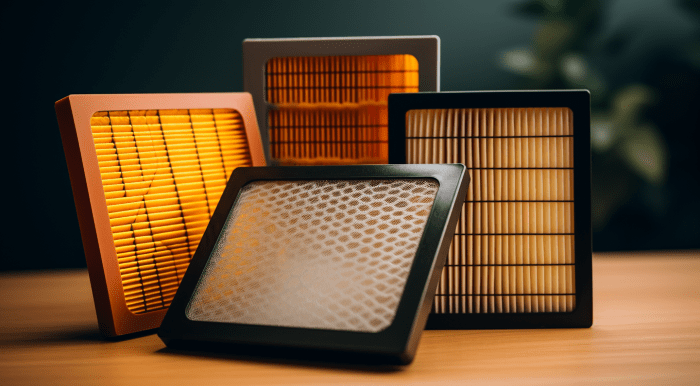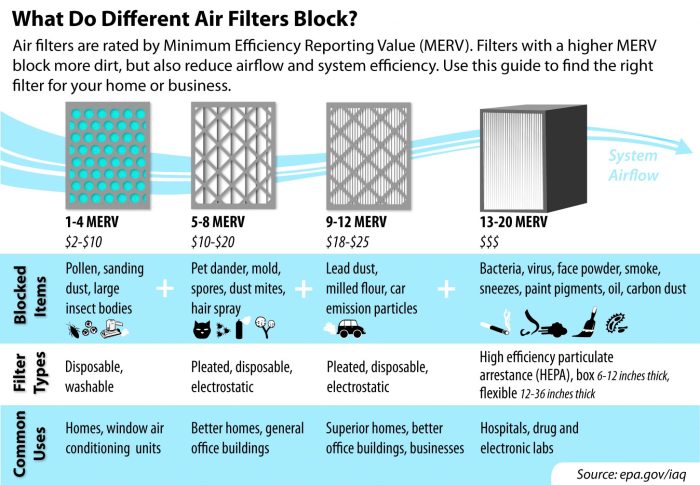Embark on a journey into the realm of AC Filters 101: Types, Lifespan, and Replacement Tips, where we unravel the mysteries surrounding this essential component of indoor air quality maintenance.
Explore the nuances of different filter types, understand their lifespans, and discover valuable replacement tips to keep your HVAC system running smoothly.
Introduction to AC Filters

AC filters play a crucial role in maintaining indoor air quality by trapping dust, pollen, pet dander, and other particles that can affect respiratory health and overall well-being.
The primary functions of AC filters in HVAC systems include improving air quality, protecting the HVAC equipment from debris buildup, and ensuring efficient airflow throughout the system.
Regular maintenance and replacement of AC filters are essential to ensure optimal performance, energy efficiency, and prolong the lifespan of the HVAC system.
Types of AC Filters
Different types of AC filters serve different purposes, each with its own set of advantages and limitations. Understanding the differences between fiberglass, pleated, HEPA, and washable filters can help you make an informed decision when choosing the right filter for your air conditioning system.
Fiberglass Filters
Fiberglass filters are the most basic and commonly used type of AC filters. They are affordable and effective in capturing large particles like dust and debris. However, they are not as efficient in trapping smaller particles or allergens compared to other types of filters.
Pleated Filters
Pleated filters are more efficient than fiberglass filters as they have a larger surface area for capturing airborne particles. They are capable of trapping smaller particles like pollen, pet dander, and mold spores. Pleated filters are a good middle-ground option in terms of efficiency and cost.
HEPA Filters
HEPA (High-Efficiency Particulate Air) filters are the most efficient type of AC filters available. They can capture up to 99.97% of particles as small as 0.3 microns, including bacteria and viruses. HEPA filters are ideal for those with allergies or respiratory conditions, but they are also the most expensive option.
Washable Filters
Washable filters are reusable and eco-friendly, making them a cost-effective option in the long run. They can be easily cleaned and reused multiple times before needing replacement. However, washable filters may not be as effective in capturing smaller particles compared to disposable filters.When choosing the right AC filter for your needs, consider factors such as air quality requirements, budget constraints, and maintenance preferences.
It's essential to strike a balance between efficiency and cost to ensure optimal performance and longevity of your air conditioning system.
Lifespan of AC Filters
AC filters play a crucial role in maintaining indoor air quality and ensuring the efficiency of your HVAC system. Understanding the factors that affect the lifespan of AC filters, recognizing signs for replacement, and implementing proper maintenance practices are essential to maximize their longevity.
Factors Affecting AC Filter Lifespan
- Usage Frequency: The more often your HVAC system runs, the quicker the filter will accumulate dirt and debris, shortening its lifespan.
- Air Quality: High levels of pollutants, pet dander, dust, and other particles in the air can clog the filter faster, reducing its effectiveness and lifespan.
Common Signs for Replacement
- Reduced Airflow: If you notice a decrease in airflow from your vents, it may indicate a clogged filter that needs replacing.
- Increased Energy Bills: A dirty filter can cause your HVAC system to work harder, leading to higher energy consumption and utility costs.
- Poor Indoor Air Quality: Dust buildup or musty odors could suggest that your filter is no longer effectively capturing contaminants.
Tips for Extending AC Filter Lifespan
- Regular Inspection: Check your filter monthly and replace it every 1-3 months, depending on usage and air quality.
- Vacuuming: Use a vacuum attachment to gently clean the surface of the filter and remove excess debris without damaging the material.
- Professional Maintenance: Schedule annual HVAC maintenance to ensure proper filter installation and overall system performance.
Replacement Tips for AC Filters

Replacing AC filters in HVAC systems is a crucial maintenance task to ensure optimal performance and air quality. Neglecting filter replacements can lead to various issues, impacting the efficiency of your HVAC system.
Step-by-Step Guide to Replace AC Filters
- Turn off the HVAC system: Before starting the replacement process, make sure to turn off the system to prevent any accidents.
- Locate the filter: Find the filter location in your HVAC system, which is typically near the air handler or return air grille.
- Remove the old filter: Carefully take out the old filter and dispose of it properly.
- Install the new filter: Insert the new filter into the filter slot, ensuring it is positioned correctly and securely.
- Turn on the HVAC system: Once the new filter is in place, turn on the system and check for proper airflow.
Frequency of AC Filter Replacements
- Standard filters: It is recommended to replace standard filters every 1-3 months, depending on usage and air quality.
- High-efficiency filters: High-efficiency filters may last longer, but it is advisable to replace them every 6-12 months for optimal performance.
Consequences of Neglecting AC Filter Replacements
- Reduced airflow: A clogged filter can restrict airflow, causing your HVAC system to work harder and consume more energy.
- Poor air quality: Dirty filters can lead to poor indoor air quality, exacerbating allergies and respiratory issues.
- HVAC system damage: Neglecting filter replacements can result in HVAC system malfunctions and costly repairs.
Last Recap

In conclusion, AC Filters 101: Types, Lifespan, and Replacement Tips shed light on the crucial aspects of maintaining optimal air quality in your living spaces. Armed with this knowledge, you can now tackle filter replacements with confidence and ensure your HVAC system operates efficiently.
Common Queries
How often should I replace my AC filter?
It's recommended to replace your AC filter every 1 to 3 months, depending on usage and filter type.
What are the signs that indicate I need to replace my AC filter?
Signs include reduced airflow, increased energy bills, and visible dirt or dust on the filter.
Can I wash and reuse washable AC filters?
Yes, washable filters can be cleaned and reused, but make sure they are completely dry before reinstallation.


